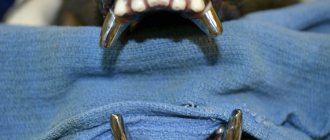Do you want to buy a dog, have you chosen a breeder, but have not yet decided when you can pick up the puppy?
There are many pros and cons, and I will help you make a choice that is convenient for you and safe for your baby's health. I will tell you when the cub is ready for independent life from a physiological point of view. How personality is formed in communication with peers and relatives. We will figure out what to do with vaccinations: buy an unvaccinated puppy or wait until the breeder immunizes it.
Stages of development of a four-legged friend
When purchasing a puppy, the owner is faced with the question of at what age it adapts best.
Puppies that have just been born are completely defenseless. The mother takes responsibility and care for them. She not only feeds them, but also takes care of their cleanliness. This period ends when the puppy is 35 days old.
Important! Many owners make a big mistake, believing that the baby can be given away as soon as the mother stops feeding him. But there must be a period of socialization and education. The mother independently teaches the children the rules of behavior.
The optimal age is considered to be 45 days. This is the time when the puppy can best get used to his new owners and conditions.
Features of feeding
Up to 35 days, babies feed exclusively on mother's milk. It contains an optimal complex of vitamins, minerals and immunoglobulins. Ready-made formulas or cow's milk will never meet the needs of a puppy's body as much as bitch's milk. Subsequently, an animal separated from its mother early will suffer from allergies to many foods, have problems with the gastrointestinal tract, and often suffer from infectious diseases.
If life circumstances have left the baby without a mother, then it is important to pay special attention to his nutrition. Puppies up to a month eat every 3-4 hours, including at night. It is important to choose a bitch milk substitute that is ideal for your dog.
Pet stores offer a wide range of ready-made mixtures, but it is better to consult a veterinarian rather than a pet store employee regarding quality and composition. Sometimes veterinarians recommend adding probiotics to the formula or adding a vitamin complex containing calcium. After 35 days, food or products that the owner plans to feed the animal for the rest of its life begin to be introduced into the baby’s diet.
Based on this information, if the baby is not left without a mother, then adopting a puppy before 35 days of age is contraindicated.
From a feeding point of view, there are also a number of recommendations on what age is best to adopt a puppy. For the first 35 days of life, furry pets are fed only with mother's milk. In this way they receive the required amount of immunoglobulins, vitamins and minerals. No other nutritional formula can replace it.
If for some reason the baby is left without a mother, feeding will cause a lot of trouble for the owner. It is best to select a suitable formula that replaces mother's milk for a puppy on the advice of a veterinarian. You need to feed your baby every 3-4 hours, including at night.
After 35 days of life, when the puppy eats on its own, it is necessary to gradually begin to accustom it to the food that the owner plans to feed his pet in the future. It is advisable that the food is not hard, as it will be difficult for the baby to eat it. When choosing food for your puppy, you should pay attention to the quality of the product.
So, when deciding at what age it is better to adopt a puppy in order to avoid problems with feeding, it is important to take into account that this baby is over 35 days old.
About age criteria for acquisition
When choosing a pet, it is very important to know its age.
Dogs up to a month old are very attached to their mother
Period from 0 to 8 weeks
It is cheapest to buy a puppy that is not yet a month old. This is because the breeder has not yet invested much in it. But such an acquisition has a big disadvantage. Babies up to a month are very attached to their mother. Their immunity is still weakened. In addition, at this age it is difficult to determine the character of the animal.
Period from 8 to 16 weeks
45 days is the best period when it is better to buy a dog. The breeder had enough time to obtain all the necessary documents for the animal. The pet will be fully vaccinated, accustomed to normal food, and will be able to eat on its own. But at this age it is still difficult to determine the character of a dog.
Period from 16 weeks and above
Buying a dog between four and six months of age is the best option. The pet has already fully developed its character. But such an acquisition has one drawback. It is recommended to find out from the owner why he did not sell the dog for so long.
It is best to adopt a dog at the age of 45 days
Vaccination
Puppies are not vaccinated until 4 weeks of age, since during this period they have immunity acquired from their mother's milk. The first vaccination is usually given after they reach 6 weeks of age. It is usually done at 6-8 weeks. This vaccine protects small puppies from deadly diseases: canine distemper, hepatitis, parvovirus enteritis and leptospirosis. Revaccination is done after 3-4 weeks. In addition, puppies are vaccinated against rabies at 3 months. Before this, deworming must be carried out. Quarantine after the last vaccination lasts 2 weeks.
Thus, it is recommended to buy a dog after all preventive measures have been taken, that is, at the age of 3.5 months.
Weight and height
When purchasing a puppy, you need to focus not only on its age. Often an important role is played by the parameters of the animal: its height and weight.
Weight Features
Weight is especially important for small breed dogs. For example, Chihuahua puppies can weigh only 500 g. Males are born larger.
Features of growth
Attention should be paid to the growth of the pet. If the animal is healthy, it will not lag behind in development, and, consequently, in growth. There are several stages of growth in a dog:
- intrauterine;
- suckling (from birth to one month);
- puppy from one and a half to six months;
- young animals from ten to twelve months;
- young individuals up to 2.5 months.
At all these stages, the physical development of the animal occurs unevenly. At birth, dogs have a long body and short legs; only by a month does the pet begin to grow in height, and the body increases in width.
Important! The ears become normal in size only when the formation of the animal’s entire body is complete. Therefore, at birth they will appear very large.
The appearance of the ears will also depend on the characteristics of the breed. For example, in a French bulldog they begin to assume their correct position only at the age of three months.
When choosing, it is important to consider the weight of the animal
At what age is it best to adopt a puppy: tips and features
Dog owners need to understand that small animals need special attention and care. It is better for the owner to study in advance all the problems that he may encounter.
What problems can there be with babies?
When purchasing a small puppy, you need to understand that it is not only about the affection of the baby’s appearance and defenselessness, but also care and attention. A number of problems often arise with babies:
- The pet constantly needs attention, this is especially true if it was separated from its mother early. German Shepherds tolerate separation the worst. It is recommended to take them no earlier than eight months. Until this age, they really need their mother's care.
- The owner needs to regularly visit veterinary clinics with the animal, follow the vaccination schedule, and carry out deworming.
- A difficult stage is expected in the process of teething.
- Owners need to be prepared for the fact that puddles will constantly appear on the floor as puppies mark their territory.
- In puppyhood, the risk of injury is increased, since the musculoskeletal system is not yet fully formed.
Important! You definitely need to watch your diet. Small puppies need to select special food so as not to spoil their stomach.
A puppy older than four months: is it possible to purchase
The older the dog, the more difficult it will be for it to get used to its family and new place. This opinion is especially widespread. But puppies at the age of three months are still adapting well. They have already developed many skills. The pet will be able to show the owner that he wants to go to the toilet. The gastrointestinal tract is stably formed.
But the new owner must be prepared that the pet has its own character. It's easier to deal with a smaller puppy. The period of maturation directly depends on the breed. For example, Dachshunds and Pugs mature faster than Labradors.
On a note! Many breeders sell the best dogs in the litter last. Therefore, adopting a puppy at four months is acceptable.
What are the advantages of purchasing mature puppies?
The procedure for purchasing an already grown dog has special subtleties. Before purchasing such a pet, you need to evaluate the pros and cons.
First of all, you need to find out why the animal was not sold for so long. Perhaps the pet was already in the family, but did not take root in it for some reason. He may be afraid when his owner leaves. This fear will greatly affect his behavior. It will be difficult for him to endure the period when the owner leaves home.
Buying a grown-up pet has its pros and cons.
There are also positive aspects of purchasing a grown-up puppy. In such an animal, all the signs of character and its advantages in appearance are already clearly visible. This is very important for those owners who take their pet to participate in exhibitions. For example, corgis or Yorkshire terriers.
Sprouted puppies are already accustomed to the toilet; they do not make a mess in the apartment, do not chew shoes and baseboards.
Read part 1. Formation of a puppy's behavior The eternal question is at what age is it best to adopt a puppy. Experienced dog breeders know that a good puppy is adopted at the age at which you are lucky enough to meet him. But anyone who gets their first dog wants to decide: when? When is it not too early? When is it not too late? Of course, the puppy will get used to its new home and owner at any age. It is only necessary that the breeder is purposefully involved in raising the growing dog the entire time she lives with him. For me, the ideal of such a breeder is the German dog handler Barbara Poole. She breeds collies and golden retrievers and trains dogs for social purposes: therapy dogs and assistants for people with disabilities. The requirements for social adaptation, willingness to cooperate, and intelligence for such dogs are maximum. Although Barbara Poole selected dogs for her kennel from lines she personally tested and continues to test all her breeding dogs, she still believes that in order to get a balanced, courageous and sociable dog, heredity alone is not enough. Atlas of dog breeds Dogs for sale Dog kennels Dog food Dog training
The foundations of behavior are laid in playing with puppies from the very first weeks of their life. At first, that is, from the first to the third week, communication with the puppies is the simplest - stroking them, caressing them, “lisping” them. Then from the fourth week he starts games. The best time to play is after the puppies have woken up and done their “business”, but have not yet eaten. She plays with each puppy three times a day, starting at two minutes and then up to ten. And one game is common for the entire litter. She believes that you need to play a little, but more often. It's much better than a big one-off game. First, she plays with them a small ball made of molded rubber or a light leather ball filled with foam rubber. You just need to make sure that it is not torn and the “fillings” are not swallowed, and, in general, you should never forget that toys from which something can be torn off and swallowed are dangerous. After a week, add one or two more toys made of molded rubber . An upside down cardboard box with a hole cut into it makes a wonderful hiding spot. The remaining games are for puppies with their mother and among themselves. What is all this for? — Behavioral researchers believe, and practice confirms, that puppies, in the process of playing and communicating with humans, not only learn to tolerate mild stress (and this initially includes our touch), but also learn to learn and find solutions in situations that are new to them. They then learn more easily and understand people better. I will keep silent about the mechanism of the positive effect of mild stress at an early age, remembering my promise not to torment the reader with “physiology.” Twice a day, Barbara Poole turns on the radio in her puppy room. According to her observations, puppies become calmer and more balanced from classical music, but rock and “pop” cause noticeable anxiety. She does this for up to 8 weeks, then the classes become more complicated, and it’s time to hand the puppies over to their owners. Such general developmental games before the release of the litter, Perhaps it is worthwhile for breeders to adopt ordinary dogs who have a less responsible future ahead of them. Usually the litter is activated at 45 days (at 6.5 weeks). Buyers arrive, at best, within the next weekend, so the minimum time recommendations are followed. It’s fortunate that the branding of puppies during activation (and this is a lot of stress!) is carried out before 8 weeks of age and for the puppy’s psyche it passes completely without a trace. After all, some researchers consider the age from 8 to 11 weeks to be the period of fear imprinting. The same puppies, who at 7 weeks joyfully rushed to greet every stranger who entered the room, a week later may look at him incredulously and approach with a certain amount of caution. Is it good or bad? A sign of future cowardice? Or, conversely, the future vigilance of a real defender? Depends on both heredity and upbringing. Likewise, the absence of fear towards strangers does not mean fearlessness in the future. In any case, whether the puppy shows signs of distrust or not, we must remember that severe fear or pain experienced at this time can lead to the fact that the circumstances that caused the fear are imprinted deep in the memory, and it will be difficult to eradicate it. In general, we humans often say: “a dog should...”, “a puppy should behave...”. He doesn't owe us anything! He behaves as his past experience, age characteristics and personal characteristics of the puppy tell him. In addition, and this should not be forgotten, dogs, depending on their personal and breed inclination, express their feelings in different ways. One puppy (usually a temperamental one) will demonstrate with his entire appearance what he is experiencing at the moment. If it is self-doubt or timidity, he will show it by his posture, the position of his tail and ears, and his gait in such a way that it will be clear to everyone around him - not only dogs, but even people. Another puppy, experiencing no less timidity, will be restrained in its external manifestation, and its owner will receive the approval of others: “What a brave puppy you have! It’s not like he’s a coward.” And puppies experience approximately the same feelings. They would say about a person that the second one has better self-control. But this is not a matter of self-control. These are just different behavioral patterns. Which type of behavior is better? For a calm person, a dog of the second type is preferable. These make excellent guide dogs, better than temperamental dogs. For a temperamental person who needs active communication and cooperation with a dog, the first type is preferable. A puppy is not cowardly, but distrustful and has had little contact with strangers, after some period of distrustful staring, it will still be happy to communicate with new acquaintances, and even more so a puppy that has been well prepared by the breeder. It is believed that between 7 and 9 weeks of age, attachment to people is easiest to develop. But I think many breeders, especially those who have gained experience in selling overstayed puppies in the last decade, will only snort in response to this statement. Everything is individual. And, in any case, if the puppy will be left to its own devices throughout your working day, or if you are a nervous person, easily irritated, then, of course, it is better to take a grown-up puppy. How to determine the future character of a puppy? Many methods are proposed - from throwing a bunch of keys to puppies to the Campbell tests, which have become widely known in the West. But studies of the reliability of such tests say that the hit rate, alas, is very small. Only extreme deviations in behavior are accurately determined, which are also extremely rare. So, you should take a good puppy at the moment in which you can meet him - if you are ready to take him, and you know what you will have to face.
Elena Alexandrova
Dogs
Raising and training dogs
At what age is it better to adopt a puppy?
Is it possible to have an adult dog?
When deciding when is the best time to adopt a dog, you need to understand that it is easier to cope with a baby. His habits, behavior, and character have not yet been formed. You can also buy an adult dog, but this entails certain difficulties in getting used to it.
For example, Yorkies and Spitz dogs have a very difficult time moving to unfamiliar territory. They become depressed and experience severe nervous tension. They can begin to behave in two ways: constantly being in fear or, conversely, showing aggression, showing everyone that they are in charge here.
When purchasing an adult dog, you need to find out from the owner the reasons why he is being given away. You should definitely inquire about the animal’s health status.
Important! An adult dog has already fully formed eating habits. It will be difficult for the new owner to accustom him to new products and regime.
What you need to know from the breeder when purchasing
Before concluding an agreement to purchase a dog, you need to ask the breeder a few questions and clarify certain points. The new owner will need to know:
- The state of health, diet and characteristics of raising the pet.
- Vaccination schedule. The breeder must provide a veterinary passport in which all vaccinations are noted.
- Number of teeth.
- Do parents have certain mental characteristics?
- Documentation. When concluding the contract, a veterinary passport and metrics are attached. The metric states the origin of the dog.
- Features of the walk. This factor depends on the needs of the breed. For example, a Yorkshire terrier, Jack Russell or spaniel does not need to be walked for a long time, but a husky needs to splash out its energy during hours of jogging outside.
Advice! If for some reason the breeder cannot provide detailed information about the dog's health, it may be better to refuse such a purchase.
The dog needs your attention and care!
Think about who will take care of the dog during your absence, who will walk it 4-5 times a day, regardless of the weather, with whom the dog will stay during your absence.
their business trips and vacations, think through all possible situations. After all, a dog is not a cat that can be trained to a litter tray and that can live its entire life in the space of your apartment. The dog needs walks, active games, chasing the ball, it needs somewhere to put its energy! In addition, you need to be prepared for the fact that until the puppy grows up and has passed all the necessary vaccinations, he cannot walk outside, and you will have to be patient when you need to clean up puddles and piles on the floor in the apartment after him, this can last up to 3-4 months. Are you ready for such troubles?
Legal side of the matter
Purchasing a purebred pet is a transaction that must comply with all legal standards. When signing documents, you need to carefully study the text of the agreement. This is a legally binding document.
Important! The breeder must include guarantees for certain qualities of the animal. If they are not confirmed, the new owner has every right to demand a reduction in value or termination of the contract.
Buying a puppy at any age has its own nuances. Attention, love and proper upbringing will help your pet adapt faster to a new family.











